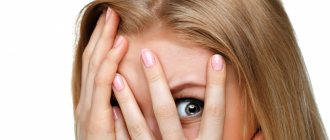Article navigation
- The essence of the problem
- How does panic manifest itself?
- Why does panic occur?
- The mental side of the appearance of fear
- What to do if you are afraid?
- Will giving up alcohol help you get rid of fear?
With prolonged use of alcohol, a person faces a complex of unpleasant symptoms. Many people believe that they are associated only with a physiological state. That is, it is a headache, nausea or vomiting. But no less pronounced changes are observed in the psyche . Patients especially often complain of a feeling of anxiety due to a hangover.
The essence of the problem
Worry for no reason, fear and anxiety from a hangover often appear simultaneously with other symptoms, such as migraines, rapid heartbeat, and nausea. But it is psychological changes that are perceived by patients as extremely difficult. If you can get rid of a headache by taking Analgin, then not a single pill can eliminate the discomfort associated with panic.
When a panic attack occurs, your health worsens even more. The adrenaline rush makes the heart beat faster. There is a sharp increase in pressure, headaches intensify . That is, against the background of fear, the patient’s physical condition also worsens.
If you don’t figure out how to relieve anxiety from a hangover in time, the condition can reach an extreme level. In this state, a person is capable of desperate acts, including suicide. Therefore, only careful attention to the health of the addict and timely assistance will help avoid dangerous consequences.
Feelings of guilt after drinking alcohol - how to get rid of them if you have wrongdoings
In cases where a person has something to be ashamed of in front of friends and colleagues, psychologists suggest following a working scheme to get rid of a depressive state:
- Admit guilt. It may be unpleasant to find out in detail what exactly you did in a drunken stupor, but it is better to immediately question witnesses and recreate the full picture.
- Forgive yourself. You need to realize that you won’t be able to live your life without making mistakes. It is likely that your “drinking buddies” behaved no better than you.
- Ask others for forgiveness. If you find out that someone has been harmed by your behavior, then you need to personally approach these people and apologize. Your appeal should be natural, without artificiality or play.
- Continue to live as before. After receiving forgiveness and establishing relationships with the people you offended, you need to move on to your usual behavior.
- Draw conclusions. Record what happened in your memory and always reproduce it as soon as you realize that the next glass will be unnecessary. Then you won’t feel guilty after drinking alcohol, and you won’t have to look for ways to get rid of it again.
Of course, this scheme is not a panacea at all, but in most cases it turns out to be extremely useful.
How to eliminate feelings of unreasonable guilt
On the one hand, everything is much simpler here - you haven’t offended anyone, which means you don’t have to apologize. However, it is worth admitting that you are suffering from a hangover and the so-called “adrenaline melancholy.” All this is the body’s reaction to processed alcohol, so you need to buy the syndrome on a physical level.
It is forbidden to drink strong coffee, tea or alcoholic drinks if you have a hangover.
How does panic manifest itself?
The severity of fear during a hangover directly depends on the following factors:
- Exactly how much alcohol was consumed.
- What strength of drink was used?
- What is the quality of the drink, that is, the presence of impurities, especially fusel oils.
- What is the general health of the patient at the time of drinking alcohol, the presence of chronic diseases and mental health.
It is noteworthy that a woman’s body differently . Ethanol breaks down more slowly, so the severity of the toxic effects is less. For this reason, they experience feelings of anxiety and stress less often.
If you can still cope with fear on your own , then panic attacks have a more severe course with their own complications. They can be recognized by the following characteristics:
- Increased heart rate.
- Frequent breathing.
- Severe fatigue.
- Strong desire to sleep.
- Tremor of arms and legs.
- Frequent urge to go to the toilet.
- A feeling of growing horror.
- Visions of both auditory and visual nature.
Symptoms do not occur in full. As a rule, 2-3 symptoms are present. But the greater the volume drunk and the stronger the drinks, the more severe the condition. In patients who try to cope with binge drinking on their own without medical help, panic attacks are especially difficult . In the later stages of alcoholism, getting rid of panic attacks rarely gives lasting results. Such patients often commit suicide. Therefore, it is important to consult a doctor at the first sign of panic due to a hangover.
How long does depression last after drinking?
It depends on the type of disorder.
- Depression associated with worsening addiction (in other words, from alcoholism). Diagnosed quite late. That is why the disease is already in an advanced stage. Treatment is complicated by the fact that the alcoholic is fully affected by psycho-emotional and personality disorders, and is no longer the same person he was before. Often some functions of the central nervous system are irreversibly damaged.
- Depression associated with withdrawal syndrome is easily diagnosed, treatable, and does not become a chronic pathology. Despite this, patients with this type of depression need the help of specialists, since the disease occurs in an acute form with suicidal behavior.
Depression is provoked by many factors - an organism exhausted by alcohol, a genetic predisposition, and a hereditary background. Depression can arise from existing subdepressive symptoms.
Doctors distinguish between clinically significant depression and worsening mood due to hangover. In the second case, there is no need to talk about depression, it is dysphoria, of which not a trace will remain after a week.
Clinical dysphoria and its symptoms can last up to 4 weeks. A specialist will help speed up recovery so that the exit from this condition is as quick and safe as possible.
Click here to view the conditions, tariffs and prices for treatment
Why does panic occur?
After alcohol enters the body, the main role in neutralizing it is assigned to the liver. This organ produces enzymes that break down ethanol into safe compounds . In the event that alcohol is consumed for a long time and in large quantities, the liver can no longer cope with its task. Enzyme production stops. Therefore, decay products remain unchanged in the body, causing poisoning.
If there is a lack of pyruvate, glucose production stops. This substance is extremely important for normal brain function. If there is a lack of it, the brain does not receive enough nutrients. In some cases, this can cause shock and death. But this happens extremely rarely. More often, people who have had too much alcohol experience the following symptoms:
- Extreme fatigue.
- Marked weakness.
- Decreased concentration.
- Expressed fear.
Such patients are characterized by the appearance of obsessive thoughts about death. This instills panic in a person.
There are also changes in the functioning of the nervous system. If small doses of alcohol cause an increase in mood, euphoria and joy, then after a while the state of health can change . Aggression, inadequacy and overexcitement appear. Even later, anxiety and fear appear with a hangover. Patients do not understand why the sensation arose, which frightens them even more.
Additional components of the drink can increase the likelihood of a panic attack. This is especially true for sweet cocktails. In addition, zinc is often added to drinks to create a specific taste. It is also worth noting that dark drinks have a more pronounced effect on the state of the psyche than light ones. After consuming them, the hangover is more severe and fear is more pronounced.
Each drink has characteristics This pronounced fear of a hangover is observed after prolonged consumption of whiskey and tequila. This is explained by the fact that during their production fusel oils, which are responsible for the taste and aroma of the drink, are not removed. They are the ones who cause changes in the psyche of an alcoholic.
In addition, the cause of fear may be cell starvation. With a lack of oxygen, the central nervous system suffers. The body loses fluid because alcoholics do not eat nutritious food due to the intake of empty calories from alcohol. The body, trying to cope with the problem on its own, tries to retain fluid, accumulating it in the tissues. This affects the brain. Poor circulation and lack of oxygen cause the development of discirculatory encephalopathy. This disease is always accompanied by the appearance of unreasonable anxiety.
With DEP, a feeling of fatigue appears; such patients are often in a state of apathy. They suffer from a feeling of shame for their behavior, provided they remember it. In other words, the appearance of anxiety is associated with severe intoxication of the body, as a result of which the brain, liver and heart suffer.
Content:
- Reasons for development
- Manifestations
- Treatment
Alcoholic depression
first described in 1920.
Subsequently, scientists confirmed the special nature of this condition, as well as the presence of various connections between alcohol addiction and the appearance of depressive symptoms. The likelihood of developing the disease depends on the severity of alcoholism - the longer and more a person drinks, the more often depressive episodes will occur, and the stronger they will manifest themselves. The prevalence of the pathology increases with aging. Most people suffering from alcoholic depression belong to the middle and older age groups (over 40 years old). In women, the disease is diagnosed more often than in men, but in the stronger sex, the clinical signs are more pronounced, and there is a higher likelihood of suicide. Many men's refusal to seek medical help contributes to the worsening of symptoms.
The mental side of the appearance of fear
The appearance of anxiety can be explained not only by symptoms of poisoning of the body. Psychological components are also important. The severity of panic increases in those patients who are trying to find a way out of life’s problems in alcohol.
Dissatisfaction with family, problems at work, failures in love. All this is filled with another dose of alcohol. Severe intoxication causes panic and shame from the realization that a person is not able to control himself. This makes the situation even worse. Such patients suffer not only from panic attacks, but also from depression.
But the feeling of guilt arises only if the patient’s center responsible for memory has not yet been damaged. But more often, addicts experience short-term memory lapses. This can also cause fear . Such people do not remember where they drank, with whom, what they did and how they behaved. It scares them. For some, their memory is restored after another dose of alcohol, others learn the truth from their drinking buddies.
Memory loss explains the way some alcoholics behave. Immediately after drinking, they lose adequacy and may show aggression, but after sobering up they do not remember anything that happened. After loved ones tell them about how they behaved, stress and panic appear, followed by shame, since the situation cannot be corrected.
Health implications
Psycho-emotional disorders in general and depression after heavy drinking in particular depress basic instincts, a person loses sexual desire, his eating behavior is disrupted, and social connections are destroyed. At the same time, drinking does not bring the desired relaxation, only provoking depression. In combination, both pathologies - alcoholism and depression - progress too quickly, even to the point of disability. Depression is a constant companion of alcoholism. The consequences are severe and often, alas, tragic:
- transition to a more severe stage of alcoholism;
- personality degradation;
- alcoholic psychosis;
- suicidal thoughts;
- unreasonable aggression towards loved ones and surrounding people;
- asocialization: loss of family, job, friends;
- exacerbation of chronic diseases, accidental injuries;
- development of affective disorders, schizophrenia, neurosis, epilepsy;
- The most tragic outcome of depression is suicide.
Therefore, doctors recommend not to delay. At the slightest manifestation of a depressive mood, you should contact a specialist; only they can provide effective help and, if necessary, tell you how to cure depression at home.
What to do if you are afraid?
At the first sign of a mood change, it's important to understand how to relieve hangover anxiety. First of all, it is important to restore contact with loved ones. A banal conversation often helps as well as a psychologist. If the method turns out to be ineffective , move on to other methods.
If the alcoholic is alone, you can leave the house, take a walk in the fresh air, or do something. It is important not to be alone with your own thoughts and to be distracted from them. You need to remember something pleasant that brings joy and a smile. But you can’t blame yourself for what you’ve done. This will only make the situation worse.
If the serious condition persists , you can take any sedative, eat your favorite dish, watch your favorite movie or listen to music.
If simple methods do not help and the condition does not improve, you need to start treatment. Considering that the cause is poisoning, it means you need to start with improving your physical condition. To do this, it is important to restore the salt balance and remove toxins:
- You need to drink as much liquid as possible, for example, herbal decoctions, tea, dairy products.
- You should not treat a hangover with another dose of alcohol. This can make the situation worse.
- It is worth increasing the amount of vitamin C in the diet. It normalizes metabolic processes, removes toxins and accelerates cell regeneration.
- A contrast shower will have an excellent effect. But if there is a high risk of heart and vascular disease, this method is not used.
- You can't refuse food. The diet should include light soups, porridges, and broths.
In the future, in order to prevent anxiety, it is important to drink light drinks, observe moderation and use only high-quality alcohol. Hangovers can be relieved with folk recipes. The faster the decay products are removed, the less pronounced the panic will be.
Treatment
Patients with alcoholic depression are hospitalized in the drug treatment department. The drug treatment regimen includes drugs from the following groups:
- Antidepressants. Citaprolam, sertraline, fluoxetine and amitriptyline are the mainstays of treatment. The minimum duration of treatment is several months. The medicine is selected individually.
- Tranquilizers. Zolpidem, lorazepam and analogues are prescribed in a short course at the initial stage of treatment. This helps to quickly alleviate symptoms of depression and reduce the severity of side effects that often appear in the first days or weeks of taking antidepressants.
- Antipsychotics. Necessary for severe cases with the development of delirium and hallucinations, phenomena of alcoholic delirium.
The antidepressant is prescribed in a small dose, then the dosage is gradually increased until a therapeutic effect is achieved. If there is no significant improvement within 3–4 weeks, the medication is replaced. In severe cases, a combination of several drugs is used. Taking medications must be supplemented with psychotherapy - this improves treatment results.
At the same time, alcoholism . Detoxification is performed using infusion therapy, drinking plenty of fluids and forced diuresis. To improve the condition of the nervous system, nootropics and B vitamins are used. Symptomatic drugs are prescribed to alleviate the symptoms of withdrawal syndrome. Provide therapy for identified chronic diseases.
Available Methods
The following will help you improve your physical condition after intoxication:
- cold and hot shower;
- Drinking plenty of fluids (mineral water, sour fruit drinks, juices, green tea);
- pharmaceutical hangover medications (for example, Alka-Seltzer, Antipohmelin and their analogues);
- a hearty meal (eating oatmeal, boiled eggs, vegetable salads is encouraged).
Sound sleep and a distraction method (go for a walk, clean the house, visit the theater) also work well in eliminating feelings of guilt. But it’s better to hold off on intense physical activity.
Contact a psychologist
At an appointment with a specialist, you can find out why you are in a bad mood after drinking alcohol, how to get rid of shame and what to do about it. It is possible that a psychotherapist will help you discover other problems that are driving you to drink alcohol. It is important that your behavior in a drunken stupor does not become the norm for you, so you need to start acting in advance.
If you are suffering from a hangover, then before visiting a psychologist you need to come to your senses, try to calm down, drink sedatives: mint tea, valerian.








